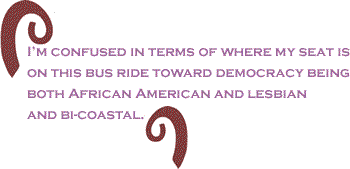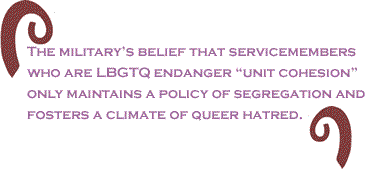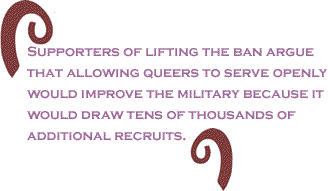
|
|||||||||||||||||||||||
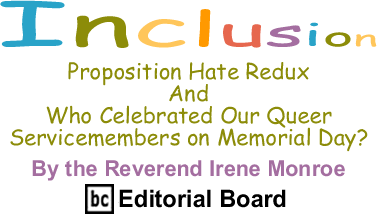
|
|

Custom Search
|
|
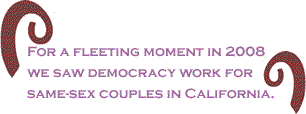 |
|
The California Supreme Court ruled again on same-sex marriage. This time it did to uphold Proposition 8, restricting marriage to one man and one woman. In a 6-to-1 decision the justices decided that Proposition 8 would remain part of the state constitution. And the 18,000 same-sex couples that ran to the altar to legally consecrate their nuptials before November 4, 2008, well they’re the lucky ones, since our right to marry can be so easily taken away by the pull of a lever. For a fleeting moment in 2008 we saw democracy work for same-sex couples in California. In a 4-to-3 decision, the California Supreme Court in May of that year ruled that a “separate and unequal” system of domestic partnership for same-sex couples is not only blatantly discriminatory, but it is also unconstitutional. The Court upheld the democratic process, offering same-sex couples “marriage” and not “marriage -lite ” with civil unions and put forth the following statement: "In contrast to earlier times, our state now recognizes that an individual's capacity to establish a loving and long-term committed relationship with another person and responsibly to care for and raise children does not depend upon the individual's sexual orientation, and, more generally, that an individual's sexual orientation -- like a person's race or gender -- does not constitute a legitimate basis upon which to deny or withhold legal rights." But California’s same-sex couples and their allies knew the knot on this issue was not securely tied. Proposition 8, so rightly dubbed “Proposition Hate,” would be the determining factor. And it was. With six months now passed since the historic day in November 4, 2008 that threw LGBTQ Americans under the bus, and symbolically removed black Americans, with the election of Barack Obama as this nation's first African American president, from riding on the back of the bus, I’m confused in terms of where my seat is on this bus ride toward democracy being both African American and lesbian and bi-coastal. Yes, I live in Massachusetts, the first state in the nation to legalize same-sex marriage. And on May 17 Massachusetts celebrated five years of marriage equality. But one of my jobs-coordinator of the Africa American Roundtable at the Center for Lesbian and Gay Studies and Ministry at the Pacific School of Religion - is in California. I’m free to marry as long as I stay within the five states that now offer me the right to. The fight for marriage equality in the U.S. is similarly to my ancestors’ fight for freedom. In their day, before the Civil War in 1861, the U.S. consisted of nineteen free states and fifteen slave states. As a matter of fact, in the 2004 presidential race between John Kerry and George Bush where marriage equality was a hot-button issue, the election map results between Kerry’s blues states and Bush’s red states corresponded to the pre-civil war free states and slave states, respectively. As LGBTQ Americans we're not in slavery, but we are certainly in a civil war. Whereas President Lincoln acted on behalf of my ancestor’s civil rights, Obama is immovable on ours. When Press Secretary Robert Gibbs was asked for a response to California’s ruling he told the Associated Press, “"I think the issues involved are ones that you know where the president stands."
When society narrowly defines marriage as the union between a man and a woman, it is not only policing the sexual behaviors of lesbian and gay people, but society is also policing the sexual behaviors of heterosexuals. Handcuffing marriage to a heterosexual paradigm merely chokes its possibility of ever flourishing and lasting, especially as we are coming to understand the fluidity of not only gender and sexual identities but also of the constant changing configuration of family units. But with heterosexual marriage being so sacred, opponents to same-sex marriage fail to see how it is constantly desecrated on any given weeknight by being slotted for family entertainment — television shows like “The Bachelor” that cavalierly join people together for high Nielsen ratings. To me, democracy is an ongoing process where people are part of a participatory government working to dismantle all existing discriminatory laws that truncate their full participation in society. The work of democracy is rooted in justice and social change allowing us to see, along this troubling human time line, those faces and to hear those voices in society of the damned, the disinherited, the disrespected, and the dispossessed. Democracy can only begin to work when those relegated to the fringes of society can begin to sample what those in society take for granted as their inalienable right. A government is ethically bankrupt when it legally frames a minority group's civil rights as a ballot question. If I waited for slaveholders to free my ancestors predicated on a ballot vote we all wouldn’t be living in the America we know today. Who celebrated our queer servicemembers on Memorial Day?
There were parades all across the country this Memorial Day commemorating our U.S. servicemembers who died while in the military. But not all of our servicemembers were honored for their acts of bravery and patriotism. Back in the day, lesbian, gay, bisexual, transgender and queer servicemembers who died while servicing our country were either closeted about their sexual orientation or were discharged under “honorable conditions” called “Fraudulent Enlistment. ” Unfortunately, today not much has changed. “I refuse to lie to my commanders. I have served for a decade under "Don't Ask, Don't Tell" -- an immoral policy that force American soldiers to lie about their sexual orientation. As a result, the Army sent a letter discharging me on April 23, “ stated Army Lieutenant Daniel W. Choi, a gay Asian American, wrote in an open letter asking President Obama not to fire him and to end the "Don't Ask, Don't Tell" policy. Choi, a West Point graduate, infantry officer, Arabic linguist, and Iraq War veteran is also one of the founders of “Knights Out” a West Point alumni organization that advocates for open service for LGBTQ American servicemembers. “I am not accustomed to begging,” Choi wrote, “ but I am begging President Obama today: Do not fire me.” As a campaign promise to LGBTQ voters President Obama empathetically stated he would repeal the discriminatory policy “Don’t Ask, Don’t Tell (DADT),” that has either discharged many of our patriotic LGBTQ servicemembers or have them pleading for their lives like Choi. However, in wanting to avoid the missteps of the Clinton administration on this hot button issue, Obama has taken no steps to repeal DADT because he hasn’t committed to a timetable. Admiral Mike Mullen, the chairman of the Joint Chiefs of Staff, told reporters that he is aware of the president's "intent to do this," but "there are no more specifics with respect to when." The conservative Center for Military Readiness sent an “open letter” to Mr. Obama saying they were “greatly concerned” about the impact of repealing DADT on recruitment, morale and unit cohesion. But the military’s belief that servicemembers who are LBGTQ endanger “unit cohesion” only maintains a policy of segregation and fosters a climate of queer hatred. It also maintains the military’s history of intolerance, as its argument is eerily reminiscent of the one it used before it was forced to racially integrate its ranks.
However, the 2002 study titled “ A Modest Proposal: Privacy as a Flawed Rationale for the Exclusion of Gays and Lesbians from the U.S. Military,” states that banning LGBTQ servicemembers would not preserve the privacy of its heterosexual servicemembers, but instead it would actually undermine heterosexual privacy because of its systematic invasion to maintain it. And, in order to maintain heterosexual privacy military inspectors would not only inquire about the sexual behaviors of its servicemembers, but it would also inquire into the sexual behaviors of the spouses, partners, friends and relatives of its servicemembers.
According to this study, heterosexuals already shower with known LGBTQ servicemembers, and very few heterosexuals are extremely uncomfortable with LGBTQ servicemembers. Robaire Watson, an African American gay veteran from San Francisco, can attest to it. “I spent six years in the navy serving on the USS Kansas City. I was the one and only barber onboard the ship. I'm a psychologist with a comb and a set of clippers. This is why I was able to interact so well with the entire crew.” Supporters of lifting the ban argue that allowing queers to serve openly would improve the military because it would draw tens of thousands of additional recruits. And government reports have shown that many of our LGBTQ servicemembers who have been discharged under DADT had critical skills, such as foreign-language proficiency, that are in great demand for the wars in Iraq and Afghanistan Homophobia, like racism and sexism, in our armed forces is militarily dangerous because it thwarts the necessary emotional bonding needed amongst servicemembers in battle, and it underutilizes the needed human resources to make a strong and democratic military. Let this Memorial Day be the last one that our queer servicemembers are forgotten. BlackCommentator.com
Editorial Board member, the Rev. Irene Monroe, is a religion columnist,
theologian, and public speaker. A native of Brooklyn, Rev. Monroe
is a graduate from Wellesley College and Union Theological Seminary
at Columbia University, and served as a pastor at an African-American
church before coming to Harvard Divinity School for her doctorate
as a Ford Fellow. Reverend Monroe is the author of Let Your Light Shine
Like a Rainbow Always: Meditations on Bible Prayers for Not-So-Everyday
Moments |
|
Any BlackCommentator.com article may be re-printed so long as it is re-printed in its entirety and full credit given to the author and www.BlackCommentator.com. If the re-print is on the Internet we additionally request a link back to the original piece on our Website. Your comments are always welcome. eMail re-print notice
If you send us an eMail message we may publish all or part of it, unless you tell us it is not for publication. You may also request that we withhold your name. Thank you very much for your readership. |
|
| |
|
| May
28, 2009 Issue 326 |
|
| Executive Editor: Bill Fletcher, Jr. |
| Managing Editor: Nancy Littlefield |
| Publisher: Peter Gamble |
| Est. April 5, 2002 |
Printer Friendly Version
in resizeable plain
text format or pdf
format. |
| Frequently Asked Questions |
 |

|
 |
 |
 |
| |
| |





























